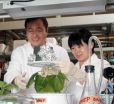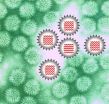(Press-News.org) Cancer researchers at Queen's University Belfast have made a breakthrough which could signal new treatments for women at high risk of breast and ovarian cancer.
Currently around one in 1,000 women in the UK carry what is known as a BRCA1 mutation - the same condition that prompted well-known actress Angelina Jolie to undergo a double mastectomy. They have up to an 85 per cent risk of developing breast cancer, and up to 40 per cent risk of developing ovarian cancer, in their lifetimes.
Until now, preventive surgery - mastectomy (breasts) and oophorectomy (ovaries) - has been the only way of reducing the risk of developing both types of cancers.
The new discovery by researchers in Queen's Centre for Cancer Research and Cell Biology (CCRCB) may mean women affected with BRCA1 could use drugs, which are already available, to reduce their risk of developing the disease, rather than undergo irreversible surgery.
In turn, such treatments would open up the possibility of some of these women, who might otherwise have an oophorectomy, still being able to have children.
The new research by Dr Kienan Savage and Professor Paul Harkin at CCRCB proves there is a direct link between high levels of oestrogen and DNA damage, which causes cancer, in the breasts and ovaries.
Specifically, the scientists discovered that the cells of women with the BRCA1 mutation cannot effectively fight the very high levels of oestrogen that exist in all women's breasts and ovaries, leaving them vulnerable to DNA damage.
While this link between oestrogen, breast/ovarian cancer and BRCA1 mutation has been suspected by the scientific community for years, it has not been proven until now.
Dr Kienan Savage, from the CCRCB, and who led the research, said: "This discovery is very significant in the management of women with the BRCA1 gene mutation. It's the first really credible evidence that oestrogen is driving cancer in women with a BRCA1 gene mutation. Because of this discovery, we now have the opportunity to propose an alternative treatment to surgery. It also opens up the possibility of pausing treatment for a period in order for women to have children, if desired.
"What also makes this exciting is that there are drugs already on the market which turn off oestrogen production. In theory, we could use these drugs to chemically reduce oestrogen production in women which could negate the need for irreversible surgery."
The Queen's-led research, which has been ongoing for four years, was carried out with funding from Cancer Focus NI and Cancer Research UK. It is carried in the latest edition of the prestigious USA-based journal Cancer Research.
Professor David Waugh, Director of the Centre for Cancer Research and Cell Biology at Queen's, said: "This breakthrough by researchers at CCRCB is great news for women with the BRCA1 gene and the cancer research community as a whole. It is pivotal in that it reveals more about the mechanisms behind breast and ovarian cancer.
"This work of Dr Kienan Savage and Professor Paul Harkin is further example of the world-leading research being undertaken at Queen's which continues to advance knowledge and change lives."
Roisin Foster, Chief Executive, Cancer Focus Northern Ireland, said: "Cancer Focus is delighted to fund this ground-breaking research into breast cancer, which has the potential in the forseeable future to benefit women all over the world. We are only able to support this vital work because of the generosity of our local community."
The researchers are currently seeking funding to launch clinical trials and hope to do so within 12 months. It is envisaged that, in the first instance, a small control trial will be carried out using a combination of two drugs on 12 women for a period of three months, using biopsy, blood and urine samples to track DNA damage.
INFORMATION:
For further information, contact the Communications Office on Tel. +44 (0)28 9097 3087 or email comms.office@qub.ac.uk
QUB discovery signals new treatment for those at high risk of breast and ovarian cancer
2014-03-28
ELSE PRESS RELEASES FROM THIS DATE:
Stool samples provide marker for bowel disease
2014-03-28
A novel method for distinguishing different types of bowel disease using the stool samples of patients has been created by a group of researchers in the UK.
It works by analysing the chemical compounds emitted from the samples and could provide cheaper, quicker and more accurate diagnoses, at the point of care, for a group of diseases that have, up until now, been very hard to distinguish.
The preliminary results of the test, which have been published today, 28 March, in IOP Publishing's Journal of Breath Research, show that patients with either inflammatory bowel disease ...
New Parkinson's disease chemical messenger discovered
2014-03-28
A new chemical messenger that is critical in protecting the brain against Parkinson's disease has been identified by scientists at the Medical Research Council (MRC) Protein Phosphorylation and Ubiquitylation Unit at the University of Dundee.
The research team led by Dr Miratul Muqit had previously discovered that mutations in two genes – called PINK1 and Parkin – lead to Parkinson's.
Now they have made a completely unexpected discovery about the way the two genes interact, which they say could open up exciting new avenues for research around Parkinson's and offer new ...
Smoking bans cut premature births and childhood asthma attacks
2014-03-28
Banning smoking in public places has helped to cut premature births by 10 per cent, new research shows.
The study of data from parts of North America and Europe where smoking bans have been introduced also showed a 10 per cent fall in hospital attendance for childhood asthma attacks.
The findings reveal that the impact of anti-smoking laws varies between countries but overall the effect on child health around the world is very positive.
Laws that prohibit smoking in public places, such as bars, restaurants and work places, are already proven to protect adults from ...
What psychosocial factors can help IVF patients?
2014-03-28
The whole 'infertility journey' is an emotional rollercoaster and whilst IVF treatment might be successful for some, not knowing if you will be in the 25 per cent who become pregnant demands some serious coping skills. After reviewing research that explored which psychosocial factors are associated with the emotional adjustment of IVF patients, researchers have highlighted which key psychosocial factors could help identify patients at high risk of stress.
The aim of the study, led by PhD student, Helen Rockliff, from the University of Bristol's School of Clinical Sciences, ...
Public smoking bans associated with reduction in premature births and childhood asthma
2014-03-28
Boston, MA – In the first comprehensive study to look at how anti-smoking laws are affecting the health of children, researchers from University of Edinburgh collaborated with researchers from Maastricht University, Hasselt University, Harvard Medical School and Brigham and Women's Hospital, to conduct a systematic review and meta-analysis examining the effect of smoke-free legislation on child health. They found that the introduction of new laws that ban smoking in public places in North America and Europe has been followed by a decrease in rates of premature births and ...
Using tobacco to thwart infectious disease?
2014-03-27
An international research group led by Arizona State University professor Qiang "Shawn" Chen has developed a new generation of potentially safer and more cost-effective therapeutics against West Nile virus, and other pathogens.
The therapeutics, known as monoclonal antibodies (MAbs) and their derivatives, were shown to neutralize and protect mice against a lethal dose challenge of West Nile virus---even as late as 4 days after the initial infection.
"The overarching goal of our research is to create an innovative, yet sustainable and accessible, low cost solution to ...
How rotavirus infection accelerates autoimmune diabetes in a mouse model
2014-03-27
A combination of genetic predisposition and environmental factors is believed to cause autoimmune (type 1) diabetes. A study published on March 27th in PLOS Pathogens gets at the mechanisms by which rotavirus infection contributes to autoimmune diabetes in a mouse model of the disease.
NOD (for non-obese diabetic) mice are prone to develop diabetes, and infection with rotavirus accelerates onset of the disease. Barbara Coulson and colleagues, from The University of Melbourne, Australia, tested the hypothesis that the virus does this by inducing "bystander activation". ...
Genetic variation linked to heart disease risk through RNA machinery
2014-03-27
Researchers have pinpointed a new mechanism of how natural variation in our DNA alters an individual's risk for developing heart disease by interfering with the ability of a developmental gene to interact with a specialized type of RNA. This work expands on previous work identifying the "hidden" causes of complex disease risk, with the goal of unlocking new pathways and potential drug targets for cardiovascular disease.
This latest study led by Thomas Quertermous, MD at Stanford University and Georg Sczakiel, PhD at the University of Lübeck (Germany) was a joint effort ...
Ancient African cattle first domesticated in Middle East
2014-03-27
Geneticists and anthropologists previously suspected that ancient Africans domesticated cattle native to the African continent nearly 10,000 years ago. Now, a team of University of Missouri researchers has completed the genetic history of 134 cattle breeds from around the world. In the process of completing this history, they found that ancient domesticated African cattle originated in the "Fertile Crescent," a region that covered modern day Iraq, Jordan, Syria and Israel.
In their study published in PLOS Genetics, Prof. Decker (University of Missouri) and a team of international ...
Autoimmune drug may help prevent kidney disease caused by diabetes
2014-03-27
Washington, DC (March 27, 2014) — A drug currently used to treat autoimmune disease may also help prevent the kidney-damaging effects of diabetes, according to a study appearing in an upcoming issue of the Journal of the American Society of Nephrology (JASN). The findings suggest that clinical trials should be designed to test the drug in diabetic patients.
Kidney disease is one of the most serious complications of diabetes. Diabetics who develop kidney disease, or diabetic nephropathy, due to high blood glucose levels may eventually require dialysis or a kidney transplant. ...


